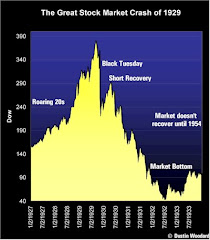
The past year provided a gut-wrenching sequence of events that will have extreme consequences for 2009. Leo Kolivakis in his Pension Pulse provided and excellent recap of 2008. He also highlights some of the potential implications of last year's events for pensions in this coming year.
One of the first challenges of the year will be to find ways to drive the Canadian economy in a period of serious recession, if not depression. All governments have come together under the mantra of more spending to stimulate the economy. This means choosing which groups in society will be chosen for bailing out. Unfortunately it will be those sectors of our society with the most cohesive and powerful political voices who will prevail.
We will see a melt down in the value of our countries pension plans based on the results of equity performance in 2008. If predictions of further troubles in commercial real estate and private equity come true, the losses will be even greater. This will mean some tough choices for the countries policy makers on what to do about pensions and retirement for Canada's Babyboomers. Recently they have been started to be called Zoomers.
As the value of the SP/TSX capitulated 35% this year, most Canadians have seen a substantial loss in their retirement savings plans. The public sector on the other hand are anticipating increasing their wages and pensions 3% to 4% this year. It is expected that growth in the Canadian economy will be negative. Many businesses have already implemented hiring freezes, unpaid days of leave and reductions in benefits to control costs.
The public sector gives themselves a raise while the private sector shrinks and the taxpayers fund it all.
There will be huge losses on Canadian pension plans this year. To check out how bad it will be see the list of equities invested by the Ontario Teachers Plan and check the stock performance at Google Finance. You can see the billions that have been lost on the equity portion of the plan. Like the dozens of other public sector plans in Canada this will be a tough year. But they do not have to worry as the pensions are "back-stopped" by the taxpayer. That means you will pick up any shortfall in the value of these funds. You need to ask your politician who will "back-stop" your pension?
Value of Pensions
One concept that most Canadians cannot understand is the value of a public sector pension.
Most Canadians have some idea of how a pension works. You save money while you are working and then draw down on it in retirement to provide you with income. However, a public sector pension does not work like this. This type of pension guarantees a continuing stream of income into retirement based on the your income at retirement. These income streams usually start after 35 working years although some exist that begin after 30 years. Of course they are indexed, meaning they automatically increase every year.
These pensions are designed to provide 70% of income retirement salary. for example this year it was announced that an elementary school teacher will earn over $90,000 at the highest level. This equates to a retirement income of almost $ 63,000. In order to provide this level of retirement a pension value over $1,000,00 is required. Yet the taxpayers funding this retirement will not have anything near this amount saved for their retirement.
Time for a Change
In 2008 there was some recognition of the problems in our retirement programs in Canada. The CFIB (Canadian Federation of Independent Business) and CD Howe Institute produced some research papers on pensions and retirement. The Canadian the press was slow to pick up on the issues but by years end many articles were being written about some of the challenges.
The trend towards recognition of the problems will continue this year and hopefully be drawn more into the public forum.
One promising trend for the reform of our system is that usually pension issues are discussed in Europe first and migrate across he big pond to Canada. Last year it was France in the spotlight e where Sarkozy was elected on an agenda of public sector reform. We saw fiery riots in Greece initially started by pension reform. In Thailand the public sector shut down the economy, after a reform government was elected, and shut down the country until finally the government was overthrown.
Currently in the UK the pension and public sector reform issue is front and center. This had been triggered by huge pension shortfalls and recognition of the cost of the public sector. Talk has begun on ending pension apartheid, as it is known as the cost of the public sector threatens to swamp the economy.
Why is Reform Needed?
A fair chance for retirement is needed for all Canadians. The level of taxation in Canada has risen to the point that most will never be able to save for their own retirement. Despite this fact, taxpayers are forced to fund gold-plated pensions for the public sector.
Awaiting with interest the New Year,
Bill Tufts



No comments:
Post a Comment